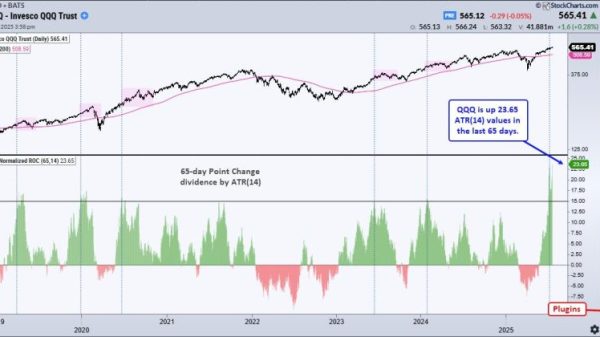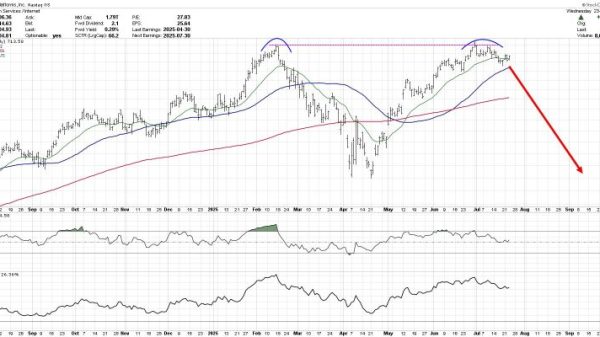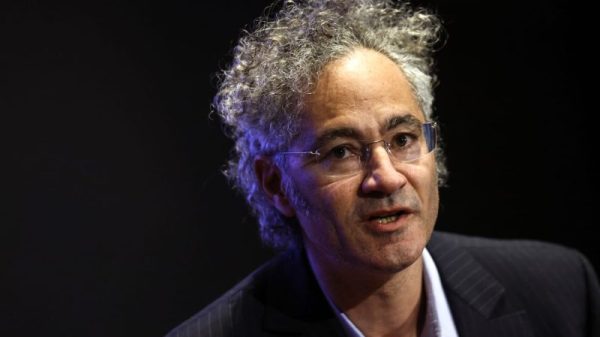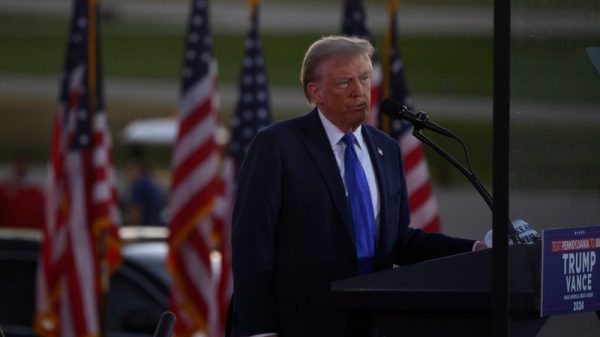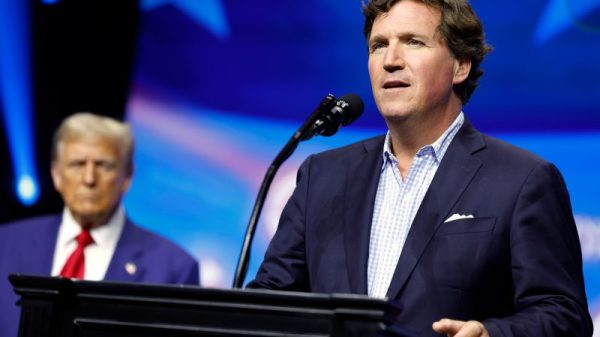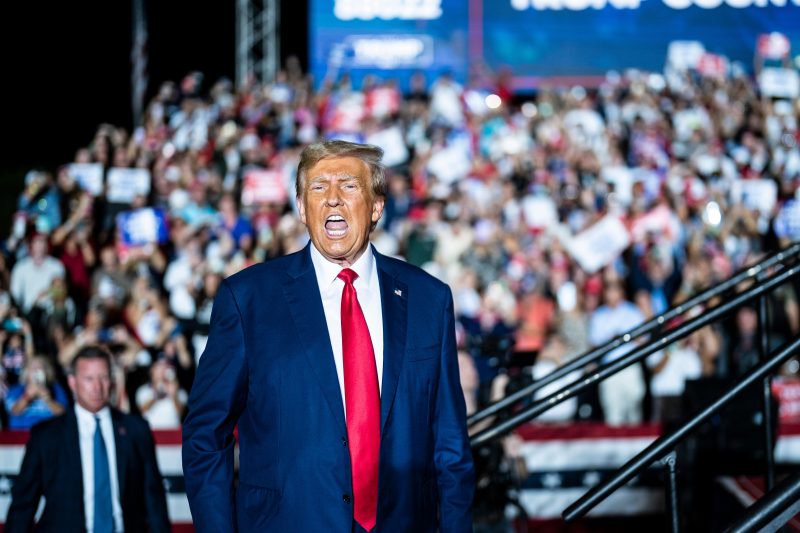Donald Trump has long toyed with the language of famous autocrats, authoritarians and fascists. Think: “enemy of the people,” “retribution” and the frequent, years-long allusions to political violence.
But even by his standards, the former president is now mining darker territory — with overtones of some of the ugliest episodes in recent world history.
The Washington Post this weekend summarized Trump’s Veterans Day speech in a headline thusly: “Trump calls political enemies ‘vermin,’ echoing dictators Hitler, Mussolini.”
Trump not only likened his political opponents to “vermin” but suggested they represent a “threat from within” that is more dangerous than threats from beyond our borders. Both are themes seized upon by strongmen to foment populist movements.
Trump’s campaign responded by seemingly taking issue with the “ridiculous” framing. But in the same breath, it also promised that Trump’s “snowflake” critics’ “entire existence will be crushed when President Trump returns to the White House.” (It later sought to amend that to “sad, miserable existence.”)
As that response indicates, the campaign is not exactly apologizing for this type of rhetoric, which is, at the very least and to be quite charitable, a calculated attempt at provocation. And after years of this kind of rhetoric and events like Jan. 6, you could certainly forgive people for worrying that it’s more than that.
“The language is the language that dictators use to instill fear,” Timothy Naftali, a senior research scholar at Columbia University’s School of International and Public Affairs, told The Post. “When you dehumanize an opponent, you strip them of their constitutional rights to participate securely in a democracy because you’re saying they’re not human. That’s what dictators do.”
Just how similar is Trump’s language to the actual words of those figures? Let’s examine how his recent comments compare with Adolf Hitler’s.
Trump said Saturday: “We pledge to you that we will root out the communists, Marxists, fascists and the radical left thugs that live like vermin within the confines of our country, that lie and steal and cheat on elections.”
As The Post’s story noted, likening one’s political opponents and certain elements within the country to vermin and beasts was a tactic employed by Hitler.
Hitler used the construct to justify the extermination of Jews and to attack Marxists, while Trump has used it more broadly to suggest that his opponents are subhuman.
“Should I not also have the right to eliminate millions of an inferior race that multiplies like vermin?” Hitler said, according to Joachim C. Fest’s biography.
“The rats that poison our body-politic gnaw from the hearts and memories of the broad masses even that little which distress and misery have left,” Hitler wrote in “Mein Kampf,” according a translation published by Project Gutenberg.
A 1939 report from a French official recalls Hitler and a Nazi official pressing the idea that “this vermin must be destroyed. The Jews are our sworn enemies.”
As Hitler historian Max Domarus recalled in his book “The Essential Hitler”:
The idea that the German government was being haplessly overtaken by Marxists and those who must be rooted out — as Trump has suggested is happening in the United States — also coursed through Hitler’s commentary.
“The German State is intensely overrun by Marxism,” Hitler wrote in “Mein Kampf.”
He added at another point: “But there is one thing [Germany’s leaders] have not known how to do, and that is how to save the German people from falling into the arms of Marxism. In that they have shown themselves most pitiably and miserably impotent.”
And at another: “What must be said of those State officials, chiefs of police, and even cabinet ministers, who showed a scandalous lack of principle in presenting themselves externally to the public as ‘national’ and yet shamelessly acted as the henchmen of the Marxists in the disputes which we, National Socialists, had with the latter.”
And another: “We must overthrow Marxism, so that for the future National Socialism will be master of the street, just as it will one day become master of the State.”
Hitler also wrote about rooting out such forces.
“We must first root out the causes which led to our collapse and we must eliminate all those who are profiting by that collapse,” he wrote.
At one point, like Trump, he even mentioned rooting out such forces while labeling them “vermin.”
“It ought to have been the duty of any Government which had the care of the people in its keeping, to take this opportunity of mercilessly rooting out everything that was opposed to the national spirit,” he wrote in “Mein Kampf.” “While the flower of the nation’s manhood was dying at the front, there was time enough at home at least to exterminate this vermin.”
“The threat from outside forces is far less sinister, dangerous and grave than the threat from within,” Trump said Saturday. “Our threat is from within.”
This was also a theme often promoted by Hitler.
“But we can see already how our racial peoples which are today still hostile to us will one day recognize the greater inner enemy,” Hitler said in a January 1941 speech in Berlin, according to the Jewish Virtual Library.
“For never in our history have we been conquered by the strength of our outside enemies but only through our own failings and the enemy in our own camp,” he wrote in “Mein Kampf.”
“Had they really believed in what they did, they ought to have recognized that the strength of a nation lies, first of all, not in its arms but in its will, and that before conquering the external enemy the enemy at home would have to be eliminated,” he also wrote.
Politicians often liken their political opponents to some version of an enemy or diminish them. Hillary Clinton talked about many Trump supporters being “deplorables.” President Biden has decried MAGA extremists and accused them of “semi-fascism.” Where Trump takes things to another level is in also dehumanizing people and suggesting that these “sinister” internal forces present the greatest threat to our country.
Trump turned heads last month by upping his anti-immigrant rhetoric in a way that the New York Times likened to Hitler’s rhetoric.
“It is a very sad thing for our country,” Trump said. “It’s poisoning the blood of our country. It’s so bad, and people are coming in with disease. People are coming in with every possible thing that you could have.”
Trump added during an Iowa rally: “It’s the blood of our country; what they’re doing is destroying our country.”
Hitler in “Mein Kampf,” employing a more explicit construct, repeatedly cited the danger of German blood being poisoned by Jews and warned more broadly of how such a thing endangers a nation.
“All the great civilizations of the past became decadent because the originally creative race died out, as a result of contamination of the blood,” he wrote.
“And so this poison was allowed to enter the national bloodstream and infect public life without the Government taking any effectual measures to master the course of the disease,” he added.
“He poisons the blood of others but preserves his own blood unadulterated,” Hitler wrote of the Jews.
“It seemed as if some all-pervading poisonous fluid had been injected by some mysterious hand into the bloodstream of this once heroic body,” he added.
Hitler even referred to the idea that Teutonic people in North America had been succeeding because they hadn’t allowed their blood to be poisoned.
“But in North America the Teutonic element, which has kept its racial stock pure and did not mix it with any other racial stock, has come to dominate the American Continent and will remain master of it as long as that element does not fall a victim to the habit of adulterating its blood.”
The full content of Trump’s comments is, of course, different from Hitler’s. Hitler was explicit about the very ugly supposed remedies. Trump paints a picture of a nonspecific boogeyman, rather than something requiring explicit action to take out a class of people. It’s less of a direct call to arms. And Trump seems to qualify his comments about “poisoning” the “blood” by pointing to drugs and supposed disease, rather than heritage.
But the language is clearly similar. And it’s certainly of a piece with Trump’s movement toward a more authoritarian second term.






